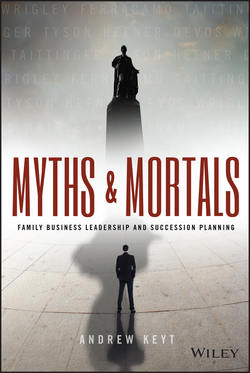Читать книгу Myths and Mortals - Keyt Andrew - Страница 6
На сайте Литреса книга снята с продажи.
Prologue: Born in the Shadows
Grappling with the humanity of the hero
ОглавлениеThe hour was late in London. And jet lag was creeping in. Though exhausted – physically, mentally, and emotionally – Bill Wrigley Jr., son of William Wrigley, heir of the William Wrigley Jr. Company, founded by his great grandfather William Wrigley Jr., hammered out a business deal with his partners from India. At Bill's initiative, the company was exploring expansion into India. At the age of 28, Bill Jr. was spearheading this effort as well as running the Canadian subsidiary and chewing-gum base subsidiary, which supplied materials to all of the company's manufacturing facilities worldwide. He was traveling the world at a dizzying pace.
Bill had been named assistant to the president, but he already felt the impending weight of future leadership. Adding to the emotional load was the burden of trying to run his areas of responsibility just like his father did – trying to be everywhere at once and managing every detail. As he remembers it, “I was running around…trying to be like my dad.” In the London flat that night, the pressure bore down on him. Bill Jr. withdrew momentarily from the meeting, not feeling well, and was sick in the bathroom. Returning to the meeting immediately after, he finished the business at hand. When the meeting was over, Bill thought to himself, “If I keep operating like this, I'm not going to make it to 40!”
His mind reeled as he thought back to recent events of the previous day, as well as the culmination of traversing three continents in a matter of days and overseeing the painstaking details he was managing as he followed his father's path. That night, Bill's gut told the truth: The stress of emulating his father was beginning to clash with who he was and who he wanted to be as a leader. This internal dissonance prompted him to give a voice to the truth: “From this point forward, I am going to start doing things differently.”
Getting sick that night was a pivotal point in Bill's life. He steered away from his father's style of leadership and began defining what style of leadership resonated with Bill – the next generation. He made a break.
Bill realized that he was trying to emulate not just his father but also the command-and-control leadership philosophy of an entire generation of Americans. They were the Greatest Generation, leading in a way that worked for a country emerging from the Great Depression and World War II. And Bill's father exemplified the best of that generation: a strong work ethic, loyalty to his people, and genuine compassion for them. For years, the company had thrived under this leadership style.
But it wasn't working for Bill, for one increasingly obvious reason – a blind spot so big that Bill had initially lost himself in it: He was not his father, though he was trying to be him.
The involuntary gut check in London prompted an integrity check as well. Leading as his father led was frustrating and stifling to him, because it wasn't true to Bill's strengths and his skill sets as well as his personal philosophy of how to get the best out of people.
It also stifled the company. The command-and-control model, which Bill describes as “the pollinating bee effect,” demanded that every decision, no matter how small, got the “king” bee's approval. “If you wanted to change the color of the carpet in China, the approval had to come from my father's desk!” In effect, the pollination was inhibiting growth. What had been so successful in the 1950s, 1960s, and 1970s now frustrated innovation among the organization's top leaders across the globe. Bill realized that he would have to redefine a vision of success for himself first, and then for the company.
